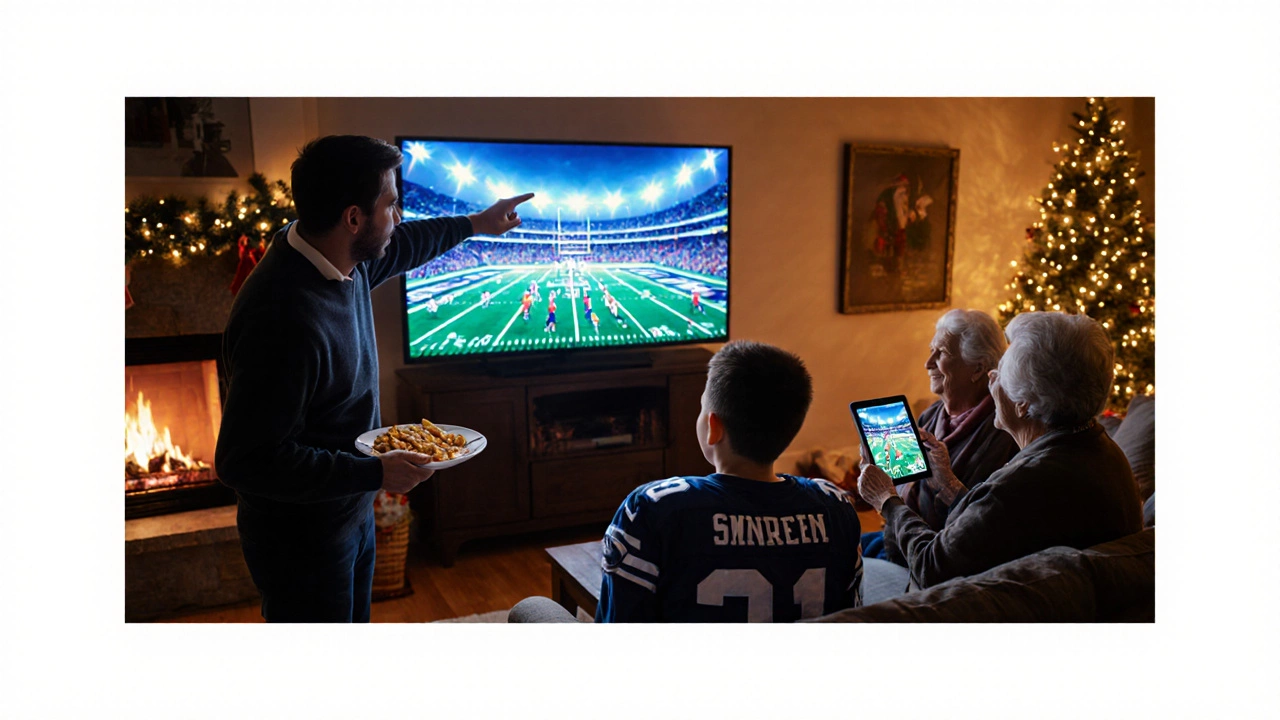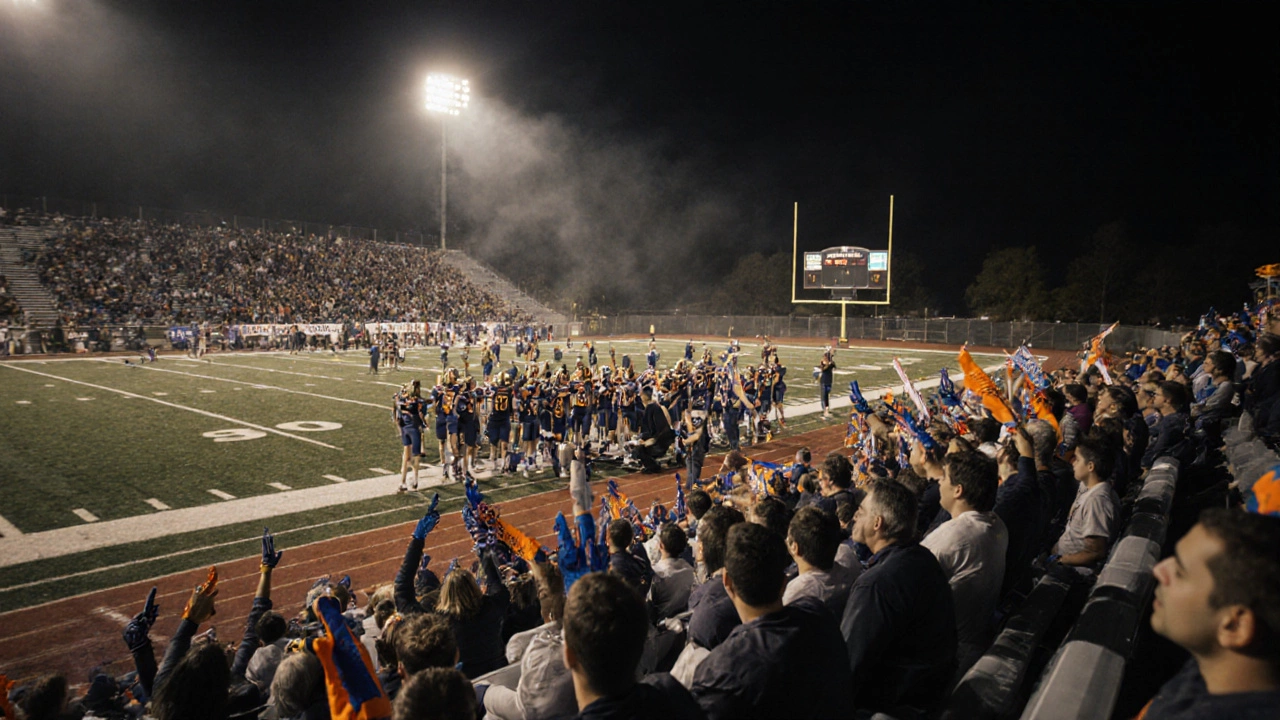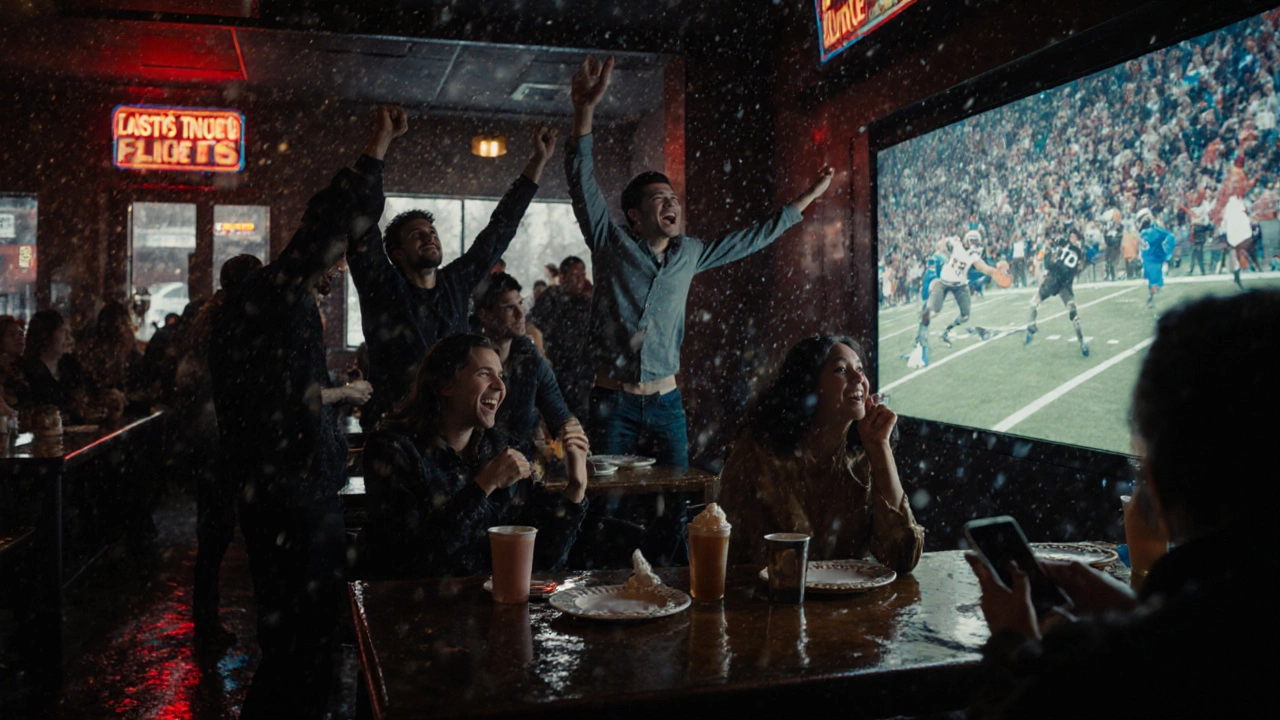
Football Community Impact Calculator
Community Impact Calculator
See how American football connects your community through viewership, education, and community building
Why Football Matters
"Football doesn't ask you to be perfect. It just asks you to care."
- From the article "Why Do Americans Love Football?"
On a chilly Sunday in November, millions of Americans put everything on hold. Kids stop playing video games. Offices go quiet. Even the coffee shops turn up the volume on the TV. It’s not a holiday. It’s not a national emergency. It’s just football Sunday. And for many, it’s the most important day of the week.
The Game Isn’t Just a Sport - It’s a Ritual
American football isn’t played like soccer or rugby. It’s a stop-start war of strategy, brute force, and split-second timing. Each play lasts under 10 seconds. Then there’s a 40-second break. Then another 10-second burst of chaos. This rhythm creates tension you can’t get anywhere else. You don’t just watch - you hold your breath. You scream. You curse. You hug strangers.
It’s not about the score alone. It’s about the buildup. The huddle. The snap. The line of scrimmage. The way a quarterback drops back, scans the field, and fires a ball 40 yards into a tiny window where only one receiver can catch it. That’s not luck. That’s precision under pressure. And when it works? It feels like watching magic.
Unlike soccer, where the ball moves constantly, football gives you moments to breathe - and then it hits you like a truck. That’s why tailgating isn’t just about food. It’s about building anticipation. People arrive hours early. They grill. They drink. They wear team colors like armor. They bring their grandparents, their kids, their coworkers. Football brings people together in a way few other things can.
The NFL Isn’t a League - It’s a Religion
The NFL has 32 teams. Most are tied to cities. Not just cities - identities. The Green Bay Packers aren’t just a team; they’re the last publicly owned franchise in the league. The city of Green Bay, population 105,000, sells out every home game. Why? Because the team is part of the town’s soul. Same with the Pittsburgh Steelers. Same with the New Orleans Saints.
People don’t just cheer for players. They cheer for legacies. Joe Montana. Tom Brady. Jerry Rice. Patrick Mahomes. These aren’t just athletes. They’re icons. Kids grow up memorizing jersey numbers. They learn plays before they learn multiplication tables. A 7-year-old in Texas can tell you exactly why the Patriots won Super Bowl LI - and what the two-minute drill was.
The Super Bowl isn’t just the championship. It’s the only time the whole country stops. It’s bigger than Christmas in some households. In 2024, over 123 million people watched the game live. That’s more than the entire population of Canada. And that’s not counting the parties, the bars, the office pools. It’s a national event - not because the government says so, but because millions choose to make it one.
Football Teaches Values - Even If It’s Violent
Let’s be honest: football is brutal. Players get knocked out. Knees tear. Spines compress. But here’s what people don’t talk about enough: football teaches discipline, resilience, and teamwork like nothing else.
In high school football, kids show up at 5 a.m. in the winter. They lift weights before class. They study playbooks on the bus. They learn that one mistake - one missed block, one delayed step - can cost the whole team. That’s not just sport. That’s life.
Coaches don’t just yell. They mentor. They push kids who have nothing else to believe in themselves. In cities with high dropout rates, football programs are often the only thing keeping kids in school. A 2023 study by the NCAA found that 92% of high school football players who graduated went on to college - more than any other sport.
It’s not perfect. Concussions are real. Player safety is still a battle. But for every story about injury, there are ten stories about a kid from a rough neighborhood who got a scholarship, got an education, and changed his family’s future because of football.

It’s the Only Sport That Feels Like a Community Project
Think about how other sports work. In baseball, you watch a guy hit a home run. In basketball, you see a dunk. In soccer, you watch a goal. But in football, every play involves 22 people working in perfect sync. One guy blocks. Another runs a route. The quarterback reads the defense. The linebacker reads the quarterback. It’s a chess match with bodies.
That’s why people feel ownership. You don’t just like your team. You feel like you helped build it. You remember the draft picks you hated. You argue about the coach’s play-calling. You know the backup safety’s name. You know which receiver dropped the pass in 2019 - and why it still hurts.
It’s not just about winning. It’s about being part of something bigger. A town can lose its factory. Its school can close. But its football team? That stays. It’s a symbol. A tradition. A reason to wake up on Sunday morning and say, “We’ve got this.”
The Media Turns It Into a National Story
Every week, ESPN, NFL Network, and local stations dissect every play, every decision, every injury. The NFL doesn’t just broadcast games - it builds stories. You don’t just watch a game. You watch a movie. The underdog. The comeback. The rookie. The veteran’s last ride.
And it’s not just TV. It’s podcasts. YouTube breakdowns. Fantasy leagues. Betting apps. There are more than 60 million fantasy football players in the U.S. That’s one in five adults. People care about stats like they’re personal investments. They track yards per carry like stock prices. They trade players like they’re managing a business.
That’s the secret: football isn’t just entertainment. It’s participation. You don’t just watch - you analyze. You predict. You argue. You feel like you’re in the locker room.

It’s Not About the Players - It’s About the People
Here’s the truth most outsiders miss: Americans don’t love football because it’s the most exciting sport. They love it because it’s the one that asks the most of them - emotionally, mentally, and socially.
It’s the game that ties generations together. Grandpas tell their grandkids about Joe Namath. Parents argue with their teens about whether Mahomes is better than Brady. Friends make bets that turn into yearly traditions.
It’s the game where a kid from Alabama and a kid from Brooklyn can sit next to each other, hate each other’s teams, and still share a beer. That’s rare in a country that’s more divided than ever.
Football doesn’t solve America’s problems. But for three hours on Sunday, it gives people something they can all agree on: this game matters. And for a few hours, that’s enough.
Why is American football so different from soccer or rugby?
American football is structured around set plays, short bursts of action, and heavy strategy. Unlike soccer, where the ball flows continuously, football stops after every play. Each play is like a mini-battle with specific roles - blockers, receivers, linemen, linebackers. The complexity of formations, signals, and adjustments makes it feel like a live chess match. Rugby is more fluid and continuous, while American football is about controlled chaos - planning, timing, and execution.
Do Americans really care about the Super Bowl more than holidays?
For many, yes. The Super Bowl isn’t just a game - it’s a cultural event. In 2024, over 123 million people watched live, making it the most-watched TV program in U.S. history. Families gather, parties are planned, and even non-fans tune in for the commercials and halftime show. It’s bigger than Thanksgiving dinner for millions. It’s a shared national experience - not because it’s forced, but because people choose to make it that way.
Is football too dangerous for kids to play?
It’s a real concern. Concussions and long-term brain injuries are serious risks. But youth football programs have changed drastically. Helmets are better. Tackling rules are stricter. Coaches are trained in safety protocols. Many schools now limit full-contact practices. The sport is evolving. The goal isn’t to eliminate football - it’s to make it safer. And for many families, the lessons in discipline, teamwork, and resilience still outweigh the risks - especially when played responsibly.
Why do people in small towns care so much about their local teams?
In small towns, football is often the only thing that unites the community. High school games are the biggest social event of the week. Families come together. Businesses sponsor teams. The whole town shows up. The team isn’t just a group of players - it’s a symbol of pride. When the team wins, the town feels like it won. When they lose, they lose together. That shared identity is powerful - especially in places with few other sources of collective joy.
How does fantasy football contribute to the sport’s popularity?
Fantasy football turns passive viewers into active participants. With over 60 million players in the U.S., it’s a massive social phenomenon. People research stats, trade players, argue over lineups - sometimes more than they care about their own jobs. It deepens engagement. You’re not just watching a game - you’re invested in every player on your team. That connection keeps people glued to the screen every week, even if their favorite team isn’t playing.
Why don’t other countries love American football like Americans do?
It’s not just the rules - it’s the culture. American football is deeply tied to U.S. history, education, and community identity. Schools, colleges, and towns build traditions around it. Other countries have their own sports with similar emotional weight - like soccer in Brazil, cricket in India, or rugby in New Zealand. American football hasn’t spread globally because it requires massive infrastructure: equipment, fields, coaching, and time. It’s expensive and complex. But in places where it’s grown - like Germany or Japan - fans are passionate. It just hasn’t reached the same cultural depth yet.
What Keeps People Coming Back?
It’s not the money. It’s not the fame. It’s not even the trophies.
It’s the feeling that when you show up - whether in a stadium, a living room, or a bar - you belong. Football doesn’t ask you to be perfect. It just asks you to care. And in a world that’s getting louder, faster, and more disconnected, that’s worth more than any championship.